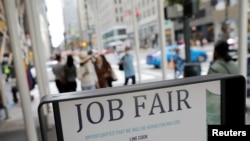First-time claims for U.S. unemployment compensation have hit a new low for the 18-month coronavirus pandemic, the Labor Department reported Thursday.
A total of 310,000 jobless workers filed for assistance last week, down 35,000 from the revised figure the week before. The figures for the last month have been the lowest since the pandemic swept through the U.S. in March 2020 but remain above the 218,000 average in 2019.
In a statement, President Joe Biden said the decreasing number of unemployment claims “is encouraging news for so many American families who have found a new opportunity and a little bit of breathing room as we continue to build back from last year’s economic devastation.”
The jobless claims total has fallen steadily but unevenly since topping 900,000 in early January. Filings for unemployment compensation have often been seen as a current reading of the country’s economic health, but other statistics are also relevant barometers.
Even as the U.S. said last month that its world-leading economy grew by an annualized rate of 6.6% in the April-to-June period, in August it only added a disappointing 235,000 more jobs, a figure economists said was partly reflective of the surging delta variant of the coronavirus inhibiting job growth.
The number of new jobs was down sharply from the more than 2 million combined figure added in June and July. The unemployment rate dipped to 5.2%, which is still nearly 2 percentage points higher than before the pandemic started in March 2020.
About 8.4 million workers remain unemployed in the U.S. There are more than 10 million available jobs in the country, but the skills of the available workers often do not match what employers want, or the job openings are not where the unemployed live.
The size of the U.S. economy – nearly $23 trillion – now exceeds its pre-pandemic level as it recovers faster than many economists had predicted during the worst of the business closings more than a year ago.
How fast the growth continues is an open question.
For months, the national government has sent an extra $300 a week in unemployment compensation, on top of often less generous state aid, to jobless workers. But that extra assistance has now ended throughout the country. About 7.5 million jobless workers were affected by the cutoff in extra funding.
The delta variant of the coronavirus also poses a new threat to the economy.
Political disputes have erupted in numerous states between conservative Republican governors who have resisted imposing mandatory face mask and vaccination rules in their states at schools and businesses, although some education and municipal leaders are advocating tougher rules to try to prevent the spread of the delta variant.
U.S. President Joe Biden is speaking later Thursday about new efforts for vaccinations, again urging those who have been reluctant for one reason or another to get inoculated to try to halt the continuing surge in the number of cases. In recent weeks, about 150,000 new cases have been identified each day in the U.S.
More than 64% of U.S. adults now have been fully vaccinated against the coronavirus.




